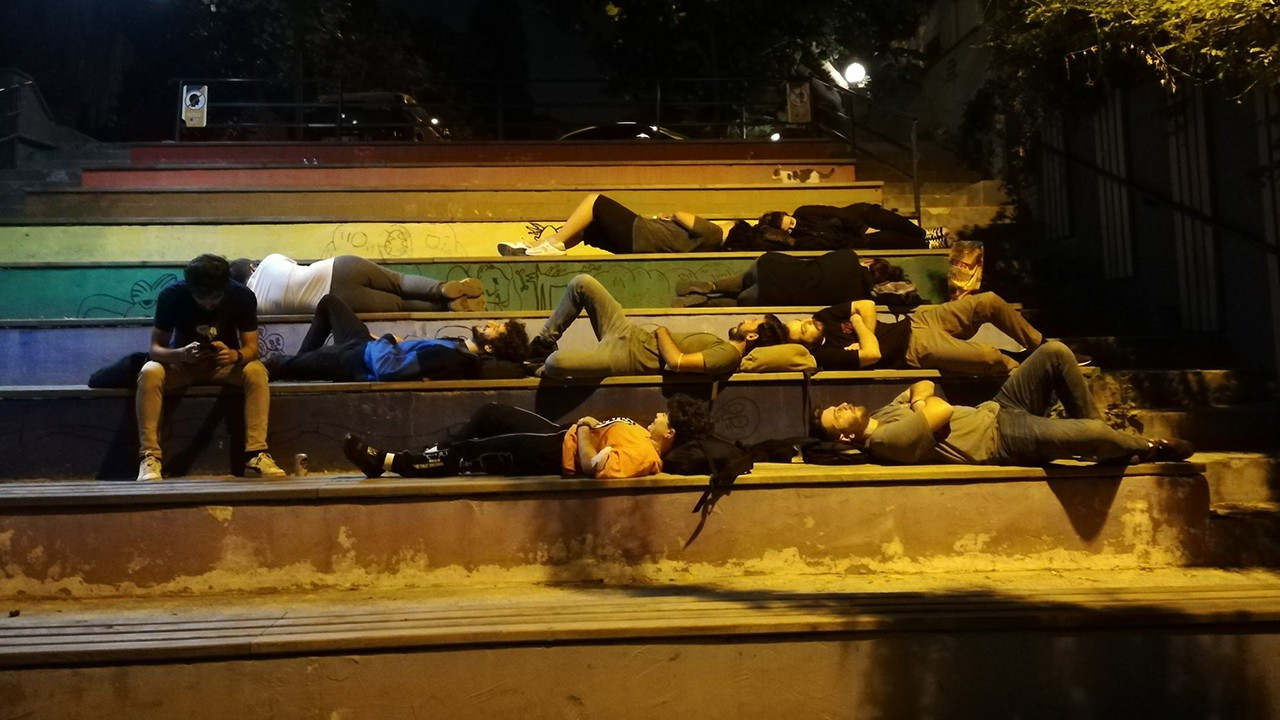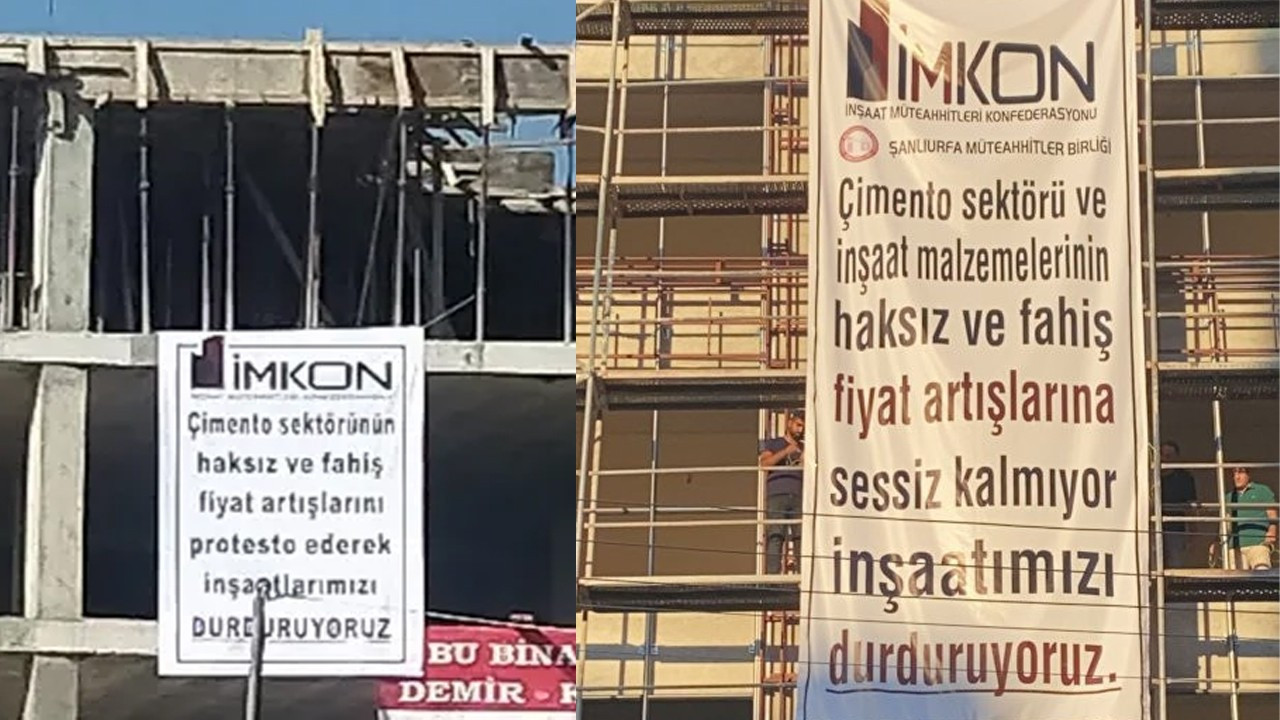Turkish students left out of dorms take to nation's streets in protest
University students across Turkey who have been left out of state dormitories have been in protest across the country's streets for the fourth night in a row on Sept. 22, sleeping outside to demand housing. The state continues to claim that all dormitory placements are going in accordance with regulations and that the students' protest is in fact a fraudulent claim.
Duvar English
Turkish university students have been sleeping on streets across the country in protest of the state's failure to place them in public dormitories, essentially leaving them homeless, but continue to receive pushback from the state that claims their discomfort is unwarranted.
Prompted by a shortage of public dormitories, the homelessness pattern among university students was exacerbated by extravagant prices for private dormitories and astronomical rent prices nationwide.
Six students were detained in western Eskişehir on Sept. 22, the fourth night of the protests, on the grounds that they had violated legislation concerning meetings and demonstrations by making a press statement and holding up a banner.
Meanwhile, in the capital Ankara, students were told by police that they couldn't enter the central Kuğulu Park or stand on the street next to it, and officers blocked a majority of the group from entering the area.
Ankara'da parka girmek de yolda durmak da yasak. Yarım saattir takip ediliyoruz. Biz bursların ve yurt kapasitelerinin arttırılmasını ve fahiş kiraların denetlenmesini istiyoruz. Sizin bize çözüm diye sunduğunuz tek barınma seçeceği ise nezarethane mi?#BarınamayanlaraSesOl pic.twitter.com/bc9OIZOwwk
— Barınamıyoruz Hareketi (@barinamayanlar) September 22, 2021
Similarly, students in Kocaeli were kept out of Cumhuriyet Park by police, the group said on their social media account "We can't find shelter."
'Youth is used by opposition'
Meanwhile, the country's Youth and Sports Minister Mehmet Kasapoğlu claimed that the students' protest was a provocation on the part of the opposition.
"The youth is a mass that the opposition wants to take advantage of. They turned this crowd into an opportunity and tried to manipulate perception," Kasapoğlu said.
Claiming that some of the demonstrators who sleep on the streets are not students, and in fact have homes in Istanbul, the minister claimed that the ministry is in contact with any students who are actually in need of housing.
The ministry placed students based on academic success, income and a third category that the minister called "social," he said, adding that there had been an accumulation of housing applications because of suspension during the pandemic.
"Another series of lies, more provocation...." wrote Deputy Interior Minister Mehmet Ersoy on Sept. 23 about the protests. "Almost none of the 127 people participating in 'We can't find shelter' protests in Istanbul have issues with housing."
Yine bir yalanlar dizisi
— Mehmet Ersoy (@mehmetersoy57) September 23, 2021
Yine provokasyon...
Kamuoyunu yanıltmaya yönelik yalanları, sahte tiyatroları paylaşmaya ve provakasyonlara karşı uyarmaya devam edeceğiz.
İstanbul’da “Barınamıyoruz” eylemlerine katılan 127 kişinin neredeyse tamamının hiçbir barınma sıkıntısı yok…⬇️ pic.twitter.com/O53XL7xfRV
The student group reacted to state rhetoric that their claims were fraudulent by responding to Kocaeli Governor Seddar Yavuz who said that the protest participants had come in from out of town, and did not have requests put in for a dorm placement.
"Students don't have housing issues, the students in protest didn't apply for dorm placement, is that right Governor Seddar Yavuz? We're sharing the results for one of our friends' applications," wrote the students.
The male student is seen to be 1337th in line for a dorm room in the smaller province of Kocaeli.
Öğrencilerin yurt sorunu yokmuş, nöbet tutan arkadaşlar yurt başvurusu yapmamış, öyle mi Kocaeli Valisi @SeddarYavuz?
— Barınamıyoruz Hareketi (@barinamayanlar) September 22, 2021
Nöbeti başlatan arkadaşlarımızdan birinin yurt başvuru sonucunu paylaşıyoruz. Üniversiteler açıldı ama hala yedeklerde olan binler var.#Barınamıyoruz pic.twitter.com/lORQLSEGBS
Meanwhile, Ankara Mayor Mansur Yavaş from the main opposition Republican People's Party (CHP) said that they would ensure all applicants are placed into dorms.
'I might quit school so my two siblings can get an education'
Former Prime Minister Ahmet Davutoğlu said that students' housing issues could lead to a drop in female university enrollment and that he met a father who considered withdrawing his daughter from school because she couldn't be placed in a public dorm.
Dokuz Eylül University senior Fatih Subaşı is among students whose education is compromised by financial struggles as the fourth child of a public servant.
"If this keeps up, I'm going to quit school so my siblings can get an education," he told Gazete Duvar. "Is my father supposed to send me or my two sisters to school with a monthly 4,500 Turkish Liras?"
Meanwhile, a group of students in Istanbul's Sporcular Park told the news portal T24 that police had started to contact students' families to halt the protests.

 Students sleep on Istanbul streets to protest astronomical rent pricesHuman Rights
Students sleep on Istanbul streets to protest astronomical rent pricesHuman Rights Turkish housing sector in crisis over astronomic rent, material costsDomestic
Turkish housing sector in crisis over astronomic rent, material costsDomestic